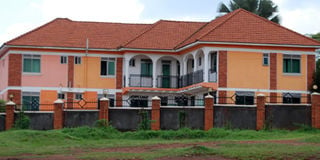Are you charging the right rent?

The rent you charge depends on the value of the property, ensure you do your research and consult professionals before setting a price. PHOTO | ISMAIL KEZAALA
Have you ever wondered why those potential tenants always question why you charge what you charge for your property? Most property owners misinterpret this question as an expression of aggression or disrespect from the tenant and choose to ignore it.
But the truth is sometimes property owners ask for a high specified rate without reason. Diana Babu, a realtor, says one of the biggest huddles is agreeing on the rent an owner wants to charge.
“As a realtor, I feel comfortable showing a property that is worth it. While I want the property owner to profit from their investment I also want them to be realistic,” she says.
Consulting professionals
While setting rent sounds easy enough, she suggests consulting property professionals for guidance. A professional will rely on experience and research to set a rate that will enable the property to make profit.
Unjustified high rent will cause a property to remain vacant and charging low rent will result in a loss for the owner. Every property has a range you can charge and one of the best things you can do, is to find it.
According to Babu, some property owners set their property rents based on comparisons to other properties in the neighbourhood.
While this seems fair at face value, it is certainly is not optimal because of factors such as difference in size, quality of finishings and age; properties became less desirable the older they get.
Right comparison
“What would be optimal is comparing your property with one that has similarities to your own. For example, if a single family property in the neighbourhood that was completed at about the same time a and has similar quality of finishing charges Shs2m, then it is safe to charge the same amount.
“But if you think yours is superior in quality, you are justified to charge slightly more than that,” she advises.
Robert Bwayo, recommends setting rent based on the current market trends. Find out what is going on in the market and respond to that.
“Always bear in mind that you are running a business and your biggest motivation is to make a profit, so once you find out what the going rate is, you can set your rate a little bit higher and use marketing, screening, and advertising to attract quality tenants,” says Bwayo.
Perceived value
Charging slightly higher will sometimes net you the kind of tenant you need because of the notion that higher rents equate to a higher standard of living. This is what is referred to as perceived value.
According to a study done in 2013 by the Journal of Economic Behaviour and Organisation, when homes were priced 10 to 20 per cent higher than comparable properties, they sold for slightly more. Bwayo says it is always advisable beginning with a high rent and bringing it down if the response is negative.
“Smart investors have no problem decreasing rent in response to market trends.
Refusing to decrease rent may cause result in extended vacancy, which is a direct and expensive hit to the return on investment,” Bwayo notes.
Bwayo’s biggest peeve with landlords is the habit of taking the existing rent and increasing it by a certain percentage without assessing the current market, especially when long-term tenant decides to move out.
“Before you adjust that rent, find out whether it is justified. Has the area appreciated in value or not? Are you willing to upgrade the property to the desired quality worth that increment? If nothing has changed, why you feel the need to increase the rent?” he wonders.
Using percentage to get the ideal rent
The most basic of pricing strategies is to take your cost and add a percentage to it.
Therefore, in order to get a return on investment (ROI) of 25 per cent, you may have to add 30, 35, or even 40 percent to the marginal cost of maintaining one apartment unit.
Estimate your monthly costs and add 30 to 40 per cent for excellent return or 0 per cent to break even. Or ask compare your property’s features vs comparable rentals in the immediate area and adjust your asking price by -20 per cent to +20 per cent depending on how competitive your property is.
If your property is in a fast developing area, add 10 per cent because of the desirability of your neighbourhood going forward into the next five years
Additional information from RentPrep.com
[email protected]




